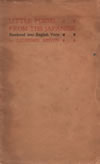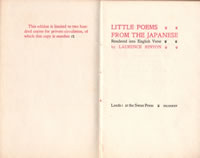
BC. Laurence Binyon
 |
 |
||
 |
|||
20. Little Poems from the Japanese, Rendered into English Verse. Leeds: Swan, 1925.
An edition of two hundred printed for private circulation. Binyon’s translation of nine tanka into rhymed metrical verse. Seven of these had appeared in 1916 in Catalogue of Japanese and Chinese Woodcuts (14).
a. From a print by Harunobu (Ap). Appeared in the Catalogue in Binyon’s description of Harunobu’s ‘The Evening Bell in Asakusa’.
b. Gotokudaiji no Sadaijin. Appeared in the Catalogue in description of Kitawo [Kitao] Masanobu’s ‘Hinazuru and Chozan’. The author, ‘Gotokudaiji no Sadaijin’ (The Gotokudaiji Minister of the Left) was Fujiwara Sanesada (1139-91), cousin of Fujiwara Teika (Ap). The poem is number 161 in the Senzaishû.
c. Kokonoye. Source unknown.
d. Gonchunagon Sada-ihe. Appeared in the Catalogue in description of Harunobu’s ‘Autumn by the Sea-Shore’. ‘Gonchunagon Sada-ihe’ (Gonchûnagon Sadaie, Assistant Imperial Advisor Sadaie) is another name for Fujiwara Teika. The poem is number 363 in the Shin kokinshû.
e. From a print by Harunobu. Appeared in the Catalogue in description of Harunobu’s ‘Blowing Soap Bubbles Under the Plum Blossom’.
f. Hakutotei Riushi of Omi. Source unknown.
g. From a print by Gakutei. Appeared in the Catalogue in description of ‘Genso and Yôkihi’, by Gakutei (ca. 1786-1868). Genso and Yôkihi are Japanese transliterations of the names of famous Chinese lovers, Ming Huang and Yang Kuei Fei.
h. Narihira (Ap). Appeared in the Catalogue in description of ‘Koriusai’s’ (Koryûsai, fl. ca. 1764-88) ‘The Children’s Rokkasen or Six Poets’. The poem, by Narihira, is number 747 in the Kokinshû (Ap). Four other poems of Narihira are translated in the Catalogue. The rokkasen, six poet-sages, are the six poets singled out for praise by Ki no Tsurayuki (Ap) in the preface preface to the Kokinshû, including most notably Narihira and Ono no Komachi (Ap).
i. Jakurin Hoshi. Appeared in the Catalogue in description of Harunobu’s ‘Girls Reading a Poem on an Autumn Evening’. Binyon identifies the poem, by the Monk Jakurin, as number 87 in the Hyakunin isshu (Ap); it originally appeared in the Shin kokinshû, number 491. A second poem by Jakurin is translated in the Catalogue.

